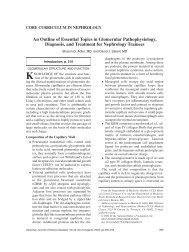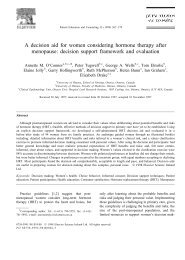Surgery and Healing in the Developing World - Dartmouth-Hitchcock
Surgery and Healing in the Developing World - Dartmouth-Hitchcock
Surgery and Healing in the Developing World - Dartmouth-Hitchcock
You also want an ePaper? Increase the reach of your titles
YUMPU automatically turns print PDFs into web optimized ePapers that Google loves.
27<br />
282 <strong>Surgery</strong> <strong>and</strong> <strong>Heal<strong>in</strong>g</strong> <strong>in</strong> <strong>the</strong> Develop<strong>in</strong>g <strong>World</strong><br />
What Can—<strong>and</strong> Should—Be Done to Try to Balance <strong>the</strong><br />
Surgical Skill Supply <strong>and</strong> Larger Needs <strong>in</strong> Tropical Surgical<br />
Care?<br />
There are no shortages of challenges <strong>in</strong> tropical medic<strong>in</strong>e 20,21 <strong>and</strong> <strong>the</strong>se problems<br />
of daunt<strong>in</strong>g size <strong>and</strong> scal<strong>in</strong>g up at an <strong>in</strong>creas<strong>in</strong>gly rapid rate are particularly true of<br />
tropical surgery. In a nation such as Malawi, 22 <strong>the</strong> population <strong>and</strong> its surgical needs<br />
have recently doubled, <strong>and</strong> little else <strong>in</strong> that nation has, with a physician:population<br />
ratio of less than 1:80,000, one of <strong>the</strong> least well-supplied <strong>in</strong> <strong>the</strong> world. That is consider<strong>in</strong>g<br />
that less than 35 of <strong>the</strong> 84 physicians are Malawian <strong>and</strong> <strong>the</strong> majority are<br />
expatriate physicians serv<strong>in</strong>g as missionary doctors. Few of <strong>the</strong>se are tra<strong>in</strong>ed surgeons,<br />
yet all must confront surgical problems, never less than 15-25% of <strong>the</strong> patients<br />
attend<strong>in</strong>g one of <strong>the</strong> two dozen hospitals. The credibility of a great deal of <strong>the</strong><br />
primary <strong>and</strong> preventive care effort rests <strong>in</strong> <strong>the</strong> capacity <strong>and</strong> care for <strong>the</strong> acute surgical<br />
curative need—such as <strong>the</strong> ever-present obstetric disasters, <strong>the</strong> worldwide plague of<br />
trauma, attend<strong>in</strong>g both transportation <strong>and</strong> <strong>in</strong>flicted violence.<br />
A realistic view of <strong>the</strong> political <strong>and</strong> economic overload rest<strong>in</strong>g on surgical care is<br />
described by an <strong>in</strong>digenous Indian surgeon <strong>in</strong> a specialty hospital <strong>in</strong> <strong>the</strong> nation’s<br />
capital 23 <strong>and</strong> it may not be pretty with <strong>the</strong> day-to-day frustrations of someone tra<strong>in</strong>ed<br />
<strong>in</strong> First <strong>World</strong> sett<strong>in</strong>gs to adapt to <strong>the</strong> high dem<strong>and</strong> <strong>and</strong> short supply of a develop<strong>in</strong>g<br />
world facility, but <strong>the</strong> reward <strong>in</strong> attempt<strong>in</strong>g to serve under such conditions is<br />
also quite clear. One suggestion is for <strong>the</strong> First <strong>World</strong> <strong>in</strong> <strong>the</strong> temperate zones to<br />
develop “world-class surgeons” 24 <strong>in</strong> collegial collaboration with those work<strong>in</strong>g <strong>in</strong> tropical<br />
surgery <strong>in</strong> order that <strong>the</strong>y may exchange specific expertise <strong>and</strong> learn from each<br />
o<strong>the</strong>r <strong>in</strong> <strong>the</strong> various adaptations each must carry out <strong>in</strong> practice <strong>in</strong> very different<br />
sett<strong>in</strong>gs <strong>and</strong> resource environments.<br />
Ano<strong>the</strong>r suggestion is for a chair of tropical surgery 25 as a legitimate specialty<br />
<strong>in</strong>terest for consideration. But, with <strong>the</strong> rapid expansion of <strong>the</strong> need <strong>and</strong> dem<strong>and</strong><br />
for surgical services <strong>in</strong> this major section of <strong>the</strong> world’s people, it may be that a new<br />
cadre of surgical primary care ancillary personnel will need to be specially tra<strong>in</strong>ed to<br />
do a limited number of <strong>the</strong> emergency procedures where <strong>the</strong>re are too few surgeons<br />
or rapid transfer systems to get such patients to a center for specialized care. Such a<br />
“Tecnicos Cirugicos” system has been well implemented <strong>in</strong> Mozambique 26 <strong>and</strong> has<br />
been supported by Royal College of Surgeons leaders. 27 The tropical surgical world<br />
is not paus<strong>in</strong>g for new <strong>in</strong>itiatives before exponentially exp<strong>and</strong><strong>in</strong>g its tropical surgical<br />
needs.<br />
A Two-Way Educational Process <strong>in</strong> Collegial Collaboration<br />
Tropical surgery is a fasc<strong>in</strong>at<strong>in</strong>g <strong>and</strong> challeng<strong>in</strong>g personal <strong>and</strong> professional commitment.<br />
It is <strong>in</strong>volved, to be sure, with <strong>the</strong> exotic—illnesses secondary to schistosomiasis,<br />
a trematode, or onchocerciasis, a filarial worm, or atypical sarcomas or<br />
lymphomas despite a relative paucity of emerg<strong>in</strong>g epi<strong>the</strong>lial carc<strong>in</strong>omas. It shares<br />
with <strong>the</strong> temperate zones <strong>the</strong> same numbers of congenital malformations, <strong>and</strong> an<br />
<strong>in</strong>tensify<strong>in</strong>g plague of trauma, but has unique <strong>in</strong>fectious surgical problems, with an<br />
underly<strong>in</strong>g poverty of resources that complicates both <strong>the</strong> disease <strong>and</strong> its care, <strong>and</strong><br />
requires resourcefulness to improvise <strong>and</strong> adapt for successful solutions. This is a<br />
very fruitful area of cl<strong>in</strong>ical <strong>in</strong>vestigation <strong>and</strong> skilled improvisation <strong>in</strong> new techniques<br />
for more efficient delivery. Many of our tropical surgery colleagues have been<br />
<strong>the</strong>re far ahead of us <strong>and</strong> we have much to learn to catch up to address a problem










